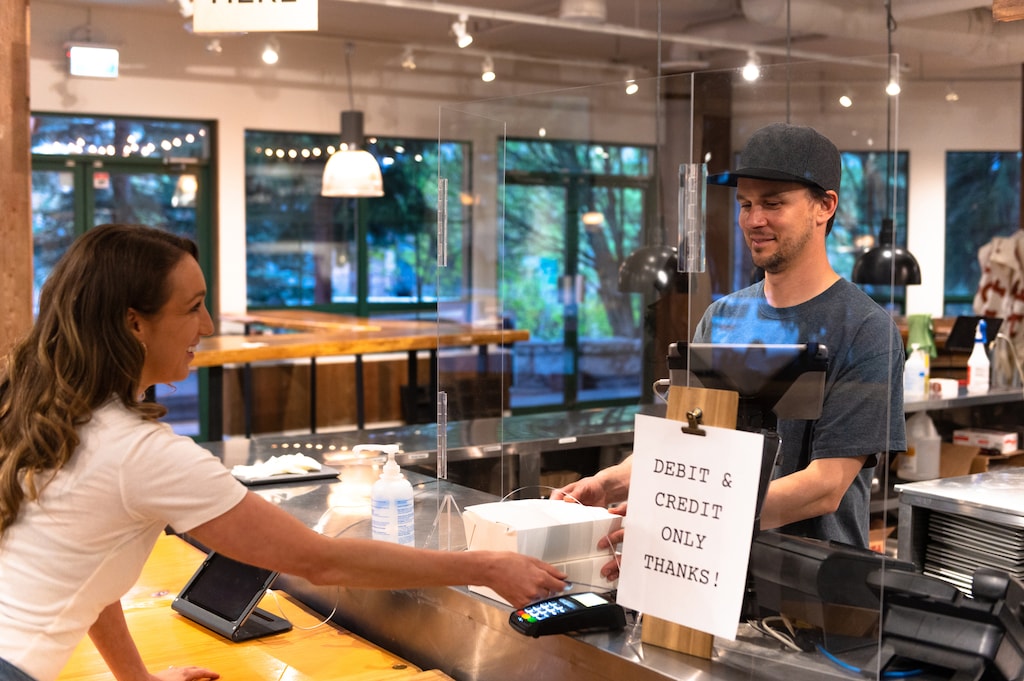As the owner of a company that produces exhibits for some of the country's biggest and most crowded trade shows, Heidi Clear's operation was hit very hard at the start of the COVID-19 pandemic and shutdown.
Then she got the coronavirus herself.
Needless to say, it's been an interesting months for Clear, who bought CenterPoint, a Woodbury, Minnesota-based full-service event-production company, with her husband Steve about two years ago. Pre-pandemic, business was booming. CenterPoint counts major consumer brands as clients, and the company's design, construction, and execution services earned it several industry accolades recently.
But what happens when mass gatherings like trade shows, not to mention mass travel to get people there literally grinds to a halt?
You pivot.
Today, if you head to CenterPoint's website, you're immediately greeted with offerings for portable desk shields for offices, social-distancing floor markers for stores, table-totable barriers for restaurants, and even a COVID-19 testing booth for frontline workers. As the country continues to work through this period, demand has clearly shifted, and new ideas to address new needs are gaining a foothold. We recently sat down with Clear, to learn more about how CenterPoint reacted quickly, what it's like to run a business while battling the virus herself, and why she's surprisingly upbeat.
How did you initially react to the crisis, being in the events industry?
I feel like we're one of the industries that was first in, and we're going to be one of the last out. It's just the nature of the beast. Even though the economy is starting to open up, it's going to take some time for that to bounce back. On the positive side, we took action right away.
Like many businesses, COVID-19 forced you to rethink some things you were already rethinking. What's changed for CenterPoint?
We were already a seasonal business, so we had wanted to look at alternative categories anyway. We have teams exploring various ideas. Branded corporate interiors, which is something we've done before. How do we expand this as a standalone business?
We're also having them look at other unrelated businesses like tiny houses, furniture. We've cast a very wide net. It's been a very good exercise in fundamental business analysis and strategy, and getting different people in the organization involved, with different ideas.
As it turns out, one of the pivots you've run with is helping to COVID-proof our daily lives as best we can, with products for stores, restaurants, and offices. How did that come about?
We wanted to fill as much of the gap as we could now. Like lots of other companies, we want to provide something in demand and retain as many employees as we can. We've been working on protective shields for stores. As the economy opens up, we all want to feel safe. We've started to get some traction on that part of the business. We also came up with an alcove to put out front of a restaurant, to minimize interaction. And floor graphics, to help with social distancing.
We're all leaning on each other more these days. What is the most meaningful support you have received throughout all this?
I will say, I wasn't this upbeat in the beginning, that's for sure. You go through the process of grieving, really, and I've come to the acceptance phase of grieving what is happening. I would say the biggest support to me has been the reaction of our employees, just being so gracious and supportive. They have their own hardships, yet many of them are reaching out to me on a regular basis and seeing how I'm doing and just acknowledging how difficult the situation is. That's just really made a huge impact on me.
And, of course, my husband. I can't imagine having done something like this on my own, because I have a partner who understands my perspective 100 percent.
What's your advice to other business owners, based on your own experience pivoting?
We really had been wanting to diversify our business, knowing that we had this seasonality, and COVID really forced that issue. We also had been planning this implementation of a new work-order and inventory system. So all of a sudden, now we have time to do it. The whole company is working on it. Now that you have the time to do it, get it done. You can do lots of research and talk to people and network. You can come up with a plan without spending much money or any money.
What do you think the events and trade-show industry will look like in the future?
I've seen many companies pivoting to virtual, which might fill the gap for a short period of time. I know in our industry there are several coalitions. It includes not just people in the trade-show industry but hospitality and travel and all of the service companies. It's the biggest industry you've never heard of. Everyone is clamoring to get back to our real face-to-face events and everyone is eagerly awaiting the return.
On top of everything, I understand you battled the virus yourself for two and a half weeks. Just as Heidi Clear, the person, how are you doing?
At the very beginning, since it hit us so hard, my husband and I were very scared. What's happening to our business? What's happening to our economy? What's happening to our health? What's happening to our kids? Eventually I came to this acceptance phase. This is our new normal for now, but once we got a handle on our cash flow and got some ideas and traction, I feel good that we are going to come out of this on the other side. So I guess that's why I am not down and out about it right now. I'm competitive and I know we're going to get through it. This is probably the hardest I've ever worked, but we've become a tighter-knit group because of it.




